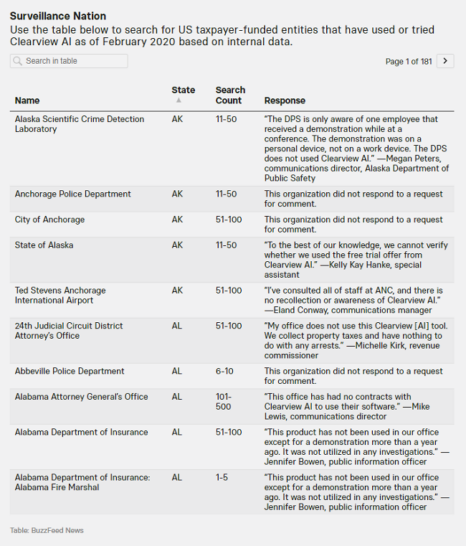Has your local police department used facial recognition software? Check this database
Every level of the government is tracking you. We’re not just talking about the internet — you probably know by now how lucrative your browsing history is. But there’s something else you have that public entities want: your face.
Facial surveillance is here, whether we like it or not. It’s inside many of our phones and laptops, and it’s even being used in countries like China to enforce quarantines for coronavirus. Speaking of which, tap or click here to see how to track the spread of the disease.
When government agencies use surveillance technology, that directly impacts your privacy, liberty and civil rights. One tech company created a powerful facial recognition tool that’s seven times bigger than the FBI’s own database. Its biggest customers are police departments around the U.S., and now, a new report reveals just how close to home this threat really is.
Clearview AI: a nightmare app, or a safety tool?
Clearview AI is a powerful company worth around $109 million. One of the ways it made its money was by scraping data shared by social media users. Although the app isn’t yet available to the general public, the New York Times says it’s only a matter of time before anyone can get their paws on its hordes of private data.
“Your face is not your own,” warns another New York Times headline. But that same article recounts how Clearview AI’s tech helped Homeland Security track down a Dark Web predator. So it can do some good.
Erin Burke, chief of H.S.I.’s Child Exploitation Investigations Unit, told the NYT that Clearview AI revolutionized the way they rescue children. “It’s only going to get better, the more images that Clearview is able to scrape,” she said.
There’s more to the story, though
Clearly, the app can help solve crimes. But privacy advocates have concerns, especially since Clearview AI is so tight-lipped about the entities that use its software. Plus, it’s not like Clearview AI only works with government agencies; it also teams up with businessmen like John Catsimatidis, who used the tech for private research.
Here’s the story, straight from a new book on police surveillance, “We See it All” by Jon Fasman. This book is an investigation into the legal and political issues surrounding how our government uses surveillance technology. Fasman shares this little anecdote that unveils Clearview AI’s capabilities:
A grocery-store magnate happened to see his daughter on a date with someone he didn’t recognize. He asked a waiter to take the guy’s picture, which he then ran through Clearview. Within seconds, the app told him who his daughter was eating dinner with—a venture capitalist from San Francisco.
Jon Fasman, “We See It All“
This is just one example of the snappy solutions users get when they use Clearview AI. Fasman’s book dives deeply into the ways police agencies are using this tech.
As you can imagine, facial recognition software is a huge help to police officers who are hot on the trail of wanted criminals. In just a few seconds, Clearview’s app reveals the person behind the photo.
HOW DOES IT WORK? How Clearview AI can identify you with only a photo of your face
Spend a little more time sleuthing, and you can find out much more. You could find a person’s address, employer, friends and family members.
And, as you can tell from the story above, anyone can be the subject of a photo-based background check. You don’t have to be a suspected criminal — you could be an average Joe on a date who didn’t notice when someone at another table snapped your photo. While you’re eating your pasta, the person at the booth beside you is browsing through your resume.
Free tool to check on local PD
Recently, BuzzFeed News collected data on the agencies and companies that have tried or used this technology. They also used public records and interviews to make this searchable database. Tap or click here to use this tool.
Plop the name of any U.S.-based taxpayer-funded organization, and you should be able to see if they’ve used Clearview’s software anywhere from 2018 to 2020. Buzzfeed includes the responses to requests for inquiry, which you can see under the “Response” header.
Here’s what the tool looks like:

BuzzFeed News mentions a few limitations in the data. For example, Buzzfeed only included agencies with at least one person who ran a facial recognition scan as of February 2020. This means the database doesn’t include other organizations that may have partnered with Clearview AI after February 2020.
Overall, though, this is a helpful tool that gives you more situational awareness. That’s because many entities don’t feel the need to come out and say whether they’ve used this technology. Now, you can take a step forward and inform yourself.
Did this news make you more concerned about your privacy? We’ve got three quick changes you can make today for more safety. Tap or click here to give yourself a quick privacy boost.
Keep reading
Was your Facebook hacked? Here’s how to check the 533 million exposed records
Use a Roku? Watch out for this sneaky tech support scam
We may receive a commission when you buy through our links, but our reporting and recommendations are always independent and objective.
